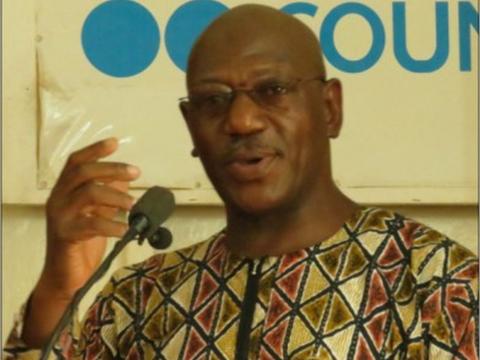By Kemo Cham
The Sierra Leone media fraternity last week commemorated World Press Freedom Day (WPFD) with appeals for President Julius Maada Bio to fulfil his campaign promise and repeal the obnoxious Criminal Libel Law.
The law, which is part of the colonial era Public Order Act, criminalizes free speech, according to journalists and media rights campaigners, who also say it hinders their work in trying to hold duty bearers to account.
The law was a center point of the campaign of former President Ernest Bai Koroma in 2007. He promised to repeal it if he won elections. But Koroma failed to deliver after winning that election and serving for 10 years in office.
Bio, during his campaign in the 2018 elections, also made similar promises. Last month he commemorated his one year in office without any concrete sign of repealing the law, other than promises. This year, he has also spoken about the repeal process.
SLAJ President Kelvin Lewis said while the journalism community was grateful with the president’s assurances, it was high time it’s put into action.
“Since you are that “talk and do” president, we recognize that you have spoken, we now want to see you do it,” Lewis said as part of his statement marking WPFD.
The umbrella journalist body commemorated the day by a symposium hosted at the British Council Auditorium in Freetown.
Mr Lewis, at the occasion, lamented the retrogressive effect of the law on the growth of the media landscape in the country, citing particularly its characteristic attribute of disregarding the truth as defence.
He also narrated how politicians have taken advantage of the law to punish journalists with the apparent intent of scaring them away from uncovering corruption and maladministration.
Those who oppose the repeal of the criminal libel law point to the bad journalism that’s practiced by a section of the media. They have always argued for the need for an alternative law to deal with such unruly practitioners.
But according to Mr Lewis, it is the same politicians who pay the “rogue journalists” to write about other politicians.
The serious journalists, he said, are not involved in that.
“But the serious journalists are hampered in improving their work because the law drives away investment and investors such that the media is kept in a perpetual cycle of poverty, and when the media is poor those politicians who have money will use them for the wrong purposes,” he said.
The global theme for the World Press Freedom Day 2019 was “Media for Democracy: Journalism and Elections in Times of Disinformation.”
But SLAJ decided to adopt its own theme which was aligned to its continued demand for the repeal of the Criminal Libel Law, hence: “Criminal Libel and Quality of journalism.”
“We have our challenges: fake news, the social media and so on, but today we must defend journalism. There should be no more excuses, the criminal and seditious libel laws must be repealed,” he vowed.
Lewis also reiterated calls for justice for slain journalist, Ibrahim Samura, who died due to injuries he reportedly sustained in the hands of politicians during the 2018 general elections.
Chairman of the Independent Media Commission, George S. Khoryama, likened the Criminal Libel to the ‘sword of Damocles’ hanging over journalists and described it as “enemy” of a free press and of freedom of expression.
“Why it is still not removed from the books of law in this country when it no longer exists in law books of the very colonialists who had introduced it here in the first place is a historical misfortune,” he said.
Mr Khoryama, a veteran journalist himself, also appealed for responsible journalism, noting that freedom of the press does not mean freedom of the press men and women alone but freedom of the people as a whole. He said the WPFD should also be for journalists a moment of retrospection of how much the media has achieved in its role in terms of providing the public not only information for the sake of information, but equally so an impartial, objective and meaningful information that could trigger sustainable national development, unity and patriotism.
“It is a day for us as media practitioners to ask ourselves whether we have fulfilled the sacred obligation of professionalism in terms of balanced and accurate reporting, fairness, excellence and above all satisfying our consciences that indeed we are good journalists. Have we adhered to the code of conducts that govern our profession?
If that is not the case then this day is meaningless to us. If it is so let God help us,” he said.
© 2019 Politico Online









